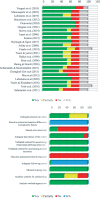The relationship between perfectionism and marital outcomes: a systematic review and meta-analysis
- PMID: 39720691
- PMCID: PMC11666362
- DOI: 10.3389/fpsyg.2024.1456902
The relationship between perfectionism and marital outcomes: a systematic review and meta-analysis
Abstract
Introduction: Perfectionism, as a transdiagnostic variable, can influence both the intrapersonal and interpersonal domains, one of the most significant of them is thought to be marital relationship. Given that perfectionism within a couple can negatively affect their intimate relationship and potentially lead to destructive outcomes, reviewing studies conducted in this area seems to be essential to gain a clearer understanding. Therefore, the present systematic review aims to examine the association between perfectionism and marital outcomes in married individuals.
Methods: A comprehensive search was conducted across major scientific databases, including APA PsycArticles, PubMed, and Web of Science, using specific keywords and Boolean operators. Included were the English-Language studies published between 1980 and 2023 that investigated the relationship between perfectionism and marital outcomes in heterosexual couples. Out of the studies identified, 23 met the inclusion criteria for this review, of which 16 studies met the criteria for meta-analysis.
Results: The meta-analysis indicated a small-to-moderate effect size for the association between perfectionism and marital outcomes (r = 0.26). Given the importance of marital relationship, such effect sizes for variables which may influence marital relationship bears significant value.
Discussion: Therefore, the findings may encourage researchers to conduct various studies to examine specific details, moderators, and mediators in the relationship between perfectionism and marital outcomes and may also prompt couple therapists to address perfectionism as a destructive factor and integrate strategies into their protocols to reduce its impact in intimate relationships.
Keywords: dyadic perfectionism; marital outcomes; meta-analysis; perfectionism; systematic review.
Copyright © 2024 Hadian Hamedani, Majzoobi and Forstmeier.
Conflict of interest statement
The authors declare that the research was conducted in the absence of any commercial or financial relationships that could be construed as a potential conflict of interest. The reviewer PJ declared a past co-authorship with the authors MRM, SF to the handling editor.
Figures




References
-
- Anhange S. T., Iorwuese P. A., Kwaghgbah A. T., Iortsughun S. T., Aondona A. T. (2017). Emotional intelligence, happiness, hope and marital satisfaction among married people in Makurdi Metropolis, Nigeria. Gender Behav. 15:3. doi: 10.4314/gab.v15i3 - DOI
-
- Ashby J. S., Rice K. G., Kutchins C. B. (2008). Matches and mismatches: partners, perfectionism, and premarital adjustment. J. Couns. Psychol. 55, 125–132. doi: 10.1037/0022-0167.55.1.125 - DOI
-
- Beck J. S. (2011). Cognitive behavior therapy: Basics and beyond. 2nd Edn. New York: Guilford Press.
-
- Biyikoglu E. B., Egeci I. S. (2017). Marital adjustment: the role of perfectionism, the ways of coping with stress and gender. New Trends Issues Proc. Human. Soc. Sci. 4, 125–138. doi: 10.18844/prosoc.v4i3.2638 - DOI
-
- Casale S., Fioravanti G., Baldi V., Flett G. L., Hewitt P. L. (2020). Narcissism, perfectionistic self-presentation, and relationship satisfaction from a dyadic perspective: narcissism and relationship satisfaction. Self Identity 19, 948–966. doi: 10.1080/15298868.2019.1707272 - DOI
Publication types
LinkOut - more resources
Full Text Sources
Miscellaneous

